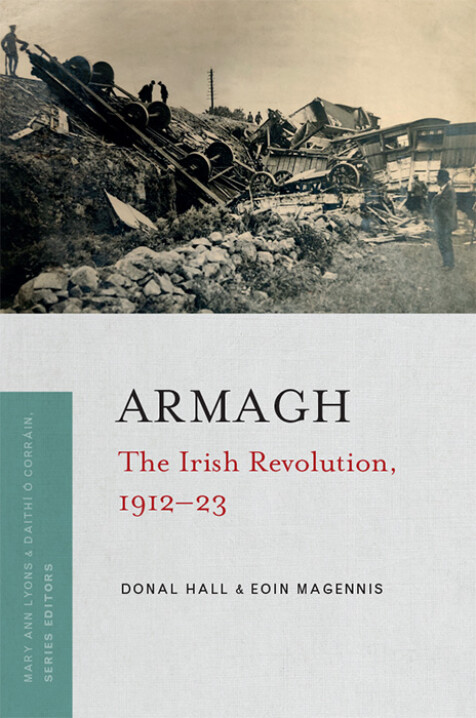Armagh
The Irish Revolution, 1912-23
Donal Hall & Eoin Magennis
"The fifteenth volume in this excellently researched and wonderfully presented series of county histories of the Irish revolutionary, Armagh, is of particular importance to our understanding not only of the period, but of a tumultuous era in the living memory of most of the residents of the island of Ireland over forty years of age, the "Troubles" in Northern Ireland from 1969 to 1998 ... This is an important work that is highly recommended, as is the series, to any student of modern Irish history." Ireland's Genealogical Gazette, Genealogical Society of Ireland, April 2024
“The Armagh book is a well-researched body of work using an impressive range of sources. The text follows the familiar chronological template, looking at the Home Rule crisis, the First World War, the 1916 Rising, the War of Independence, the Treaty and the Civil War. Interwoven within the chapters are discussions on the labour movement, feminism and social and economic history. It is a huge undertaking to cover such a diversity of topics in a relatively short publication, just 124 pages. Nevertheless, that neat chronological structure, with relatively short chapters, makes things digestible for the expert and lay reader alike … Overall, this is a very impressive publication with innovative use of sources”. Patrick Mulroe, History Ireland, September-October 2024
“One measure of a history book’s worth is that it gives you not only a clear insight into the past but also a better understanding of the present. This much can certainly be said of the Armagh volume of the Irish Revolution series ... This excellent account of Armagh in the tumultuous years 1912–23 provides the context for why even tranquil Tynan invoked the motif of historical loyalist resistance in response to the ‘Irish Sea border’ controversy over a century later ... the book demonstrates how the political and sectarian divisions of this county run deep … This is the first comprehensive scholarly publication documenting the sweep of events in the county during this pivotal period ... Absent is any sense of partisan rhetoric or ideological purpose on the authors’ part … The fruits of research in 13 different archives, outlined in a 12-page select bibliography, are positively evident. The pages abound with enlightening observations of every political hue … the authors skilfully make clear how the near parity of ethno-religious groups in high population density, contesting land and employment, created acute communal tensions. The depictions of spiralling violence and vengeful killing in the early 1920s are succinct yet chilling. Echoing the earlier point about Tynan, by reading of tit for-tat atrocities like those at Cloghogue and Altnaveigh one can appreciate how their traumatic effects endured to become intergenerational, commemorated and resonating to the present day. Outside of Belfast, scarcely anywhere else in the north did internecine conflict reach such a level. Portents to future cycles of violence can be seen not only in sectarian reprisals but also in the IRA’s ruthless elimination of alleged informers, brutal assaults on women, the dumping of bodies and the shooting dead of a Catholic magistrate (James Woulfe Flanagan) on his return from Mass at Newry cathedral. … Plus ça change?" Donal McAnallen, Familia. Ulster Genealogical Review. No. 40 (2024)

